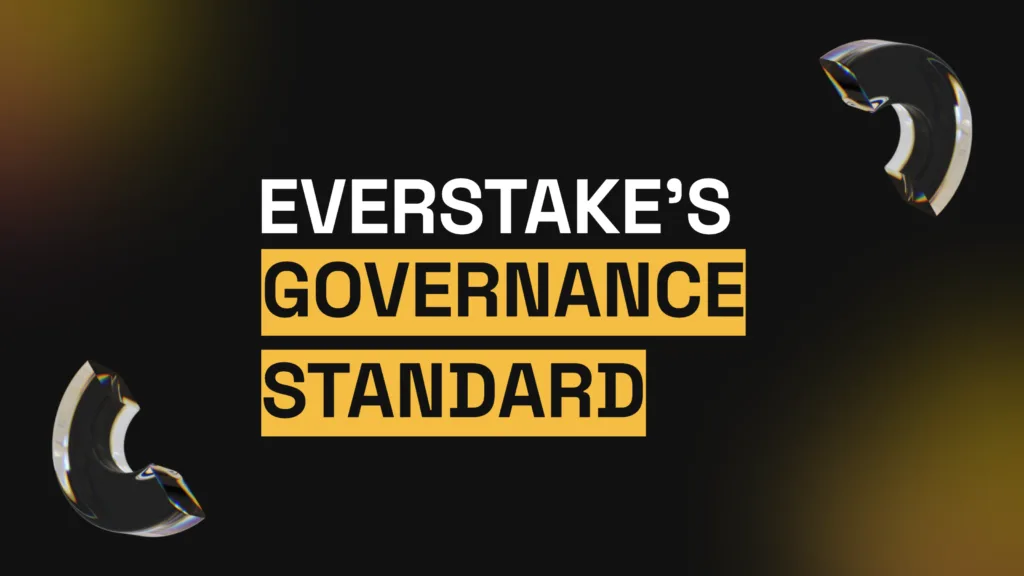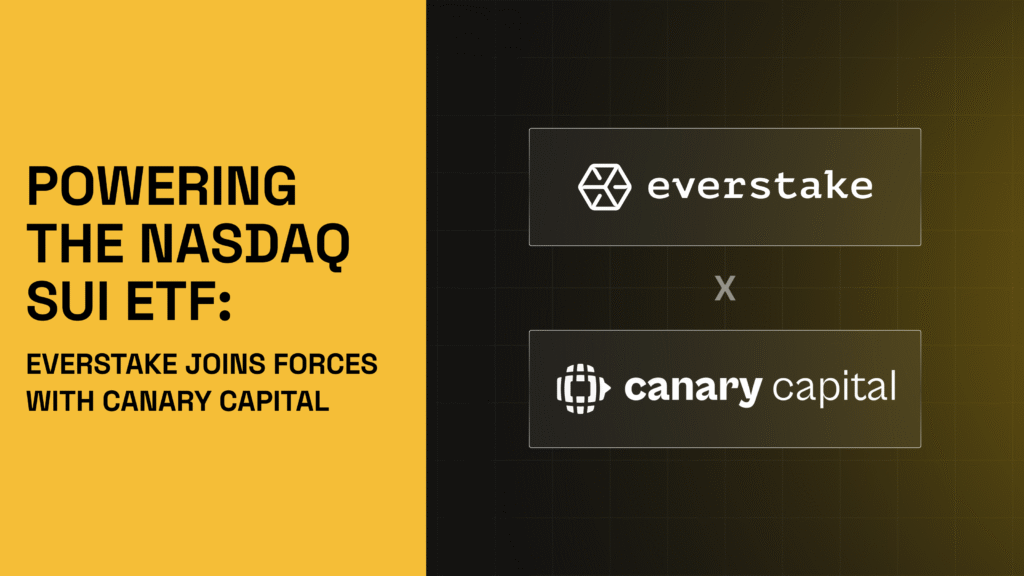
Company News
Blockchain Governance: Our Approach
Blockchain governance is the process that enables participants of the networks to decide on how the blockchain will develop in the future. It includes proposing and voting on protocol upgrades, managing security and transparency. Similar to how large companies rely on boards of directors to chart their course, in blockchain, all future decisions are influenced by a “board” of validators and stakeholders who secure their tokens as collateral.
JUL 18, 2023
Table of Contents
What is Blockchain Governance
Why Blockchain Governance Matters?
Optimal Validator Engagement in Blockchain Governance: A Strategic Approach
Everstake’s Governance Standard
Share with your network
Governance in the blockchain is an integral and essential concept. Similar to how large companies rely on boards of directors to chart their course, in blockchain, all future decisions are influenced by a “board” of validators and stakeholders who secure their tokens as collateral.
While some blockchains have well-established governance with active engagement from participants, others may face low involvement.
In this material, we’re sharing what governance is, why validators should indeed care about it, and how we at Everstake do blockchain governance.
What is Blockchain Governance
Blockchain governance is the process that enables participants of the networks to decide on how the blockchain will develop in the future. It includes proposing and voting on protocol upgrades, managing security and transparency.
Governance ensures that the blockchain will remain stable and aligned with participants’ interests, making it a ground pillar of decentralized blockchain systems.
Blockchain governance exists in different forms; we can primarily divide them into the on-chain and off-chain ones.
On-chain Governance
On-chain governance refers to the governance processes that occur directly on the platform. A prime example of pure on-chain governance is formal voting on platform-related issues using the governance token.
On-chain governance examples include:
-
Tezos: At Tezos, XTZ token holders can delegate block verification (“baking”) and governance rights to other nodes. Delegators propose changes, and the voting process involves five stages. A proposed change must surpass the strict threshold of 80% of the delegated voting power to be implemented.
-
EOS: It utilizes a variant of Proof-of-Stake (PoS) called Distributed Proof-of-Stake (DPoS) and claims the ability to handle millions of transactions per second. EOS token holders elect 21 block validators who validate all network transactions. EOS does not specify an off-chain mechanism for discussing or voting on potential changes. Similar to Tezos, all governance occurs on the blockchain, and accepted changes are automatically implemented.
-
Maker DAO: It is a leading decentralized finance (DeFi) platform that employs a formal on-chain voting process while relying heavily on off-chain signaling and discussions when considering potential changes.
Off-chain Governance
Off-chain governance encompasses all governance-related processes in public blockchains outside the platform. This includes discussions on social media, online forums, conferences, and other events.
Off-chain governance examples guide us to the most popular blockchains – Bitcoin and Ethereum:
-
Bitcoin lacks substantial on-chain governance mechanisms like governance tokens, and although holding BTC coins grants a voice in off-chain discussions, it does not provide specific voting rights. Consequently, all discussions and voting take place off-chain.
For instance, significant changes proposed for Bitcoin undergo thorough online discussions among key stakeholders. These stakeholders include the core development team, other developers, miners, researchers, and the end-user community. Bitcoin’s core development team conducts regular online meetings open to anyone interested.
Some mistakenly equate mining/hash power held by large mining pools on Bitcoin with governance power. However, miners do not possess governance privileges, and their role is limited to verifying or rejecting transaction blocks.
Miners cannot modify Bitcoin’s code even if they control 100% of the block verification activity. While they can potentially hold the network hostage for a short period through majority mining control, they cannot gain the majority of voting power to dictate code changes.
In summary, the share of mining power on Bitcoin does not translate into an equivalent share of governance rights.
-
Ethereum governance happens off-chain with a wide variety of stakeholders involved in the process. It includes a core development team led by Vitalik Buterin, renowned within the community, along with researchers, advisors, miners, platform users, and token holders. Proposed changes undergo active off-chain discussions on forums, boards, and social media.
Why Blockchain Governance Matters?
Although everyone is pretty aware of the importance of governance, even large validators sometimes ignore the correct participation in this blockchain development process. That is why we want to remind you why the involvement of validators is of great importance.
Validator’s governance matters significantly in decentralized blockchain networks for several crucial reasons:
-
Security: Validators play a critical role in maintaining the network’s security. By validating transactions and blocks, we ensure that only legitimate transactions are added to the blockchain, preventing double-spending and other malicious activities. Our proper governance decisions can enhance the network’s security and protect it from attacks.
-
Stability: Validators are integral to the consensus mechanism of the blockchain. In Proof-of-Stake (PoS) networks, tokens staked as collateral determine who will be the following block creator. This is necessary for the network’s stability and reliability, which leads to the smooth functioning of the blockchain.
-
Upgrades implementation: Validators are involved in proposing and voting on protocol upgrades and changes. This upgrades the blockchain’s capabilities, scalability, and performance.
-
Community representation: Validators often represent a diverse community of delegators. Our governance decisions have to reflect the interests of this community.
-
Transparency and accountability: Validators usually vote transparently, and everything is recorded on the blockchain. Those who practice responsible governance build trust and confidence within the community.
-
Fork management: In case of disagreements or contentious issues within the community, validators are those to manage forks. Our decisions on which fork to support can significantly impact the network’s continuity and consensus.
Optimal Validator Engagement in Blockchain Governance: A Strategic Approach
To maximize impact as a validator in blockchain governance, it is crucial to adopt a strategic approach tailored to the specific design of the platform. Here are key guidelines for effective participation:
-
Validator should master the governance model: Develop a comprehensive understanding of the blockchain platform’s governance model. Uncover the intricacies of its on-chain, off-chain, or hybrid approach. This deep comprehension will empower the validator to navigate the governance process with finesse and precision.
-
Foster influential off-chain discourse: In off-chain governance models, proactively engage in high-level discussions and debates on prominent social media platforms, online forums, or industry conferences. Amplify the validator’s voice by sharing astute insights, providing constructive feedback, and forging alliances with key stakeholders who can help shape the platform’s governance direction. Validators should stay attuned to the core development team’s meetings, seizing opportunities to contribute and make their mark.
-
Cultivate informed decision-making: Embrace an unwavering commitment to staying informed. Validators should regularly monitor the latest updates, announcements, and discussions surrounding governance matters. This wealth of knowledge will empower validators to make astute decisions and meaningfully contribute to the governance process.
-
Educate and elucidate: Validators should take on the mantle of a knowledgeable interpreter. Synthesize complex proposals, distilling them into critical insights and actionable points. Validator’s expertise should extend to providing accessible explanations and illuminating concepts through tangible examples. This skill will bridge the divide between technical intricacies and community comprehension, fueling inclusive discussion and driving consensus.
-
Cultivate strategic alliances: Forge strong relationships with other validators, influential community members, and the esteemed core development team. Cultivate strategic partnerships that foster collaboration, allowing validators to exchange ideas, drive alignment, and help to explain critical governance decisions. These relationships will strengthen your impact and extend your reach within the ecosystem.
-
Uphold transparency and integrity: Champion a culture of unwavering transparency and integrity throughout validators’ governance journey. Prioritize the best interests of the platform and its community, consistently evaluating proposals through the lens of sustainable growth and long-term viability. Embrace constructive feedback, remaining adaptable and open-minded in the face of compelling arguments and fresh insights.

By meticulously tailoring this approach to the unique governance design of the blockchain platform, validator positions itself as a force to be reckoned with in shaping its future. This strategic business approach unlocks the validator’s true potential, paving the way for influential contributions and sustainable governance excellence.
Everstake’s Governance Standard
And finally, here is how we at Everstake ensure smooth governance processes:
-
We participate in a minimum of 90% of proposals. For us, it’s as important as technical performance since the pace and efficiency of project development depend on adopting effective management decisions. This is possible since Everstake has separate teams for each blockchain we validate.
-
As validators, we educate and simplify complex proposals, making them understandable for everyday users. We participate in discussions, provide essential points, and use straightforward examples to bridge comprehension gaps.
-
We always strive for transparency around voting decisions by providing complete and detailed information on the cause-and-effect relationship of decision-making. Also, we’re always open for discussions within the community.
-
To increase individual voting rates, we provide delegators with exhaustive information, that includes short summaries, explanation of our vote, arguments for and against the proposal, tutorials on voting from leading wallets, and consideration of incentive programs for individual voting
-
Clear communication with delegators is key! We establish wide-ranging, high-quality channels tailored to their preferences. By providing explanations and training opportunities, we empower an informed community to make wise decisions.
These are just a few examples of our recent participation in the governance of blockchains:
Everstake is a responsible validator trusted by 625k+ users across 70+ blockchain networks. Created by engineers for the entire community in 2018. Our strategy to achieve that is always to be helpful to the crypto community and partners. Our competition has to work better and faster to keep on par with us, and this ensures the entire blockchain industry is moving forward — which benefits everyone.
Share with your network
Related Articles

Company News
Everstake Partners with Canary Capital to Power Staking in the Newly Launched Nasdaq-Listed SUI ETF
Everstake, the leading global non-custodial staking provider, has entered a partnership with Canary Capital, a digital asset investment management firm. Together, the companies will power the staking capabilities of the newly launched SUIS, a SUI ETF, now officially listed on Nasdaq. This groundbreaking exchange-traded fund represents a major leap forward for institutional digital asset adoption,...
FEB 20, 2026

Company News
Everstake and Cometh Launch Fiat-to-Staking Solution for EU Institutions Under MiCA
This partnership simplifies institutional access to staking under MiCA, bridging traditional banking infrastructure with compliant, crypto-native rewards.
JAN 07, 2026

Company News
The Year Everstake Stepped Into Full Infrastructure Leadership
2025 marked a shift for Everstake toward full infrastructure leadership, combining audited systems, institutional partnerships, and ecosystem responsibility.
DEC 24, 2025
Disclaimer
Everstake, Inc. or any of its affiliates is a software platform that provides infrastructure tools and resources for users but does not offer investment advice or investment opportunities, manage funds, facilitate collective investment schemes, provide financial services or take custody of, or otherwise hold or manage, customer assets. Everstake, Inc. or any of its affiliates does not conduct any independent diligence on or substantive review of any blockchain asset, digital currency, cryptocurrency or associated funds. Everstake, Inc. or any of its affiliates’s provision of technology services allowing a user to stake digital assets is not an endorsement or a recommendation of any digital assets by it. Users are fully and solely responsible for evaluating whether to stake digital assets.
Sign Up for
Our Newsletter
By submitting this form, you are acknowledging that you have read and agree to our Privacy Notice, which details how we collect and use your information.